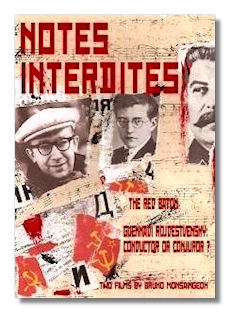
The Internet's Premier Classical Music Source
Related Links
-
Prokofieff Reviews
Schnittke Reviews - Latest Reviews
- More Reviews
-
By Composer
-
Collections
DVD & Blu-ray
Books
Concert Reviews
Articles/Interviews
Software
Audio
Search Amazon
Recommended Links
Site News
 DVD Review
DVD Review
Bruno Monsaingeon

Notes Interdites
- The Red Baton: Scenes of musical life in Stalinist Russia
- Gennady Rozhdestvensky: Conductor or Conjuror?
- Bonus Features
- Alfred Schnittke: Suite "Dead Souls" (Based on Schnittke's film score)
- Serge Prokofieff: Cantata "Zdravitsa"
Symphony Capella Orchestra and Choir of Russia/Gennadi Rozhdestvensky
Idéale Audience International DVD 3073498 Dolby Digital 2.0 Full Screen
This Bruno Monsaingeon DVD contains two films: the first The Red Baton, as its subtitle suggests, is a portrait of musical life – and sometimes life of the common citizen – in Stalinist Russia; the second is a documentary about conductor Gennadi Rozhdestvensky. Rozhdestvensky is a major figure in the first film as well, and conducts both works in the bonus tracks. Monsaingeon, of course, is a veteran of this kind of thing, having made acclaimed films about Glenn Gould, David Oistrakh, Sviatoslav Richter and others in the music world. These two films, and the bonus tracks, collectively must be counted among his finest efforts.
To be honest, I was riveted to my seat watching them. I plan to watch them again and again, in fact – they are that good, that enlightening. In The Red Baron there are rarely-seen clips of Prokofieff, Shostakovich, Stravinsky and other notable figures in Russian and Soviet music. Of course, you see the menacing Stalin as well, and you clearly gain a sense, if you hadn't one before, of the oppression, even terror, inflicted on musicians and artists by Stalin. I found Rozhdestvensky's opinions fascinating throughout: he's outspoken about the oppression, about Tikhon Krennikov and other musical and political personalities, and about so much else.
The second film is largely about Rozhdestvensky and his ideas about conducting. There are clips of Prokofieff, Rostropovich and other notable figures in Russian music here as well. Both films feature numerous excerpts from famous works, from Tchaikovsky's Roméo and Juliet to Prokofieff's 3rd Piano Concerto; from Haydn's C Major Cello Concerto to Shostakovich's 7th Symphony. It is all quite insightful and worthwhile to anyone with an interest in serious music or conducting.
The bonus tracks are attractive, especially the rarely heard Prokofieff Cantata, Zdravitsa. Not that the Schnittke work is negligible – it too is quite worthwhile, quite humorous in places. I recognized several parodies in the Schnittke score, including a clever one of the funeral march in the Mahler 5th first movement and a frantic one of the octave cadenza in the Tchaikovsky 1st Piano Concerto's first movement. Rozhdestvensky and his wife, pianist Viktoria Postnikova, engage in some humorous antics in the Schnittke performance and draw a few laughs from the audience. It's all well done, but I believe, in the end, musicians aren't comedians and should be very sparing in their attempts at visual humor.
To sum up, I can say is that this is priceless stuff and fully worth the attention of serious listeners (and viewers) of classical music. Rozhdestvensky fans will especially like the documentary films, particularly the second one. Oddly, this great conductor comes across as more congenial in the first film, when he's reminiscing about musical matters and life, than the second, when he becomes mainly a pedagogue on conducting and musical analysis. At any rate, I urgently recommend this DVD!
Copyright © 2008, Robert Cummings





















